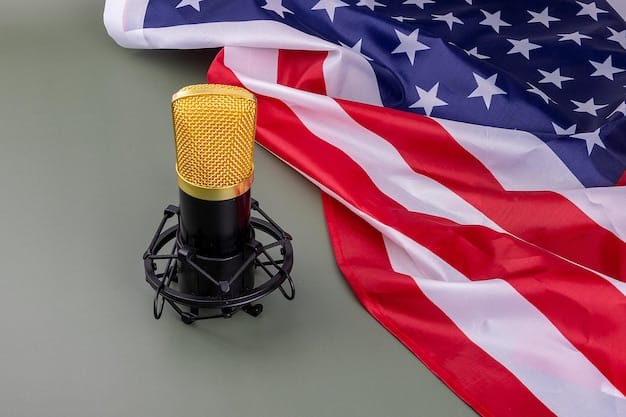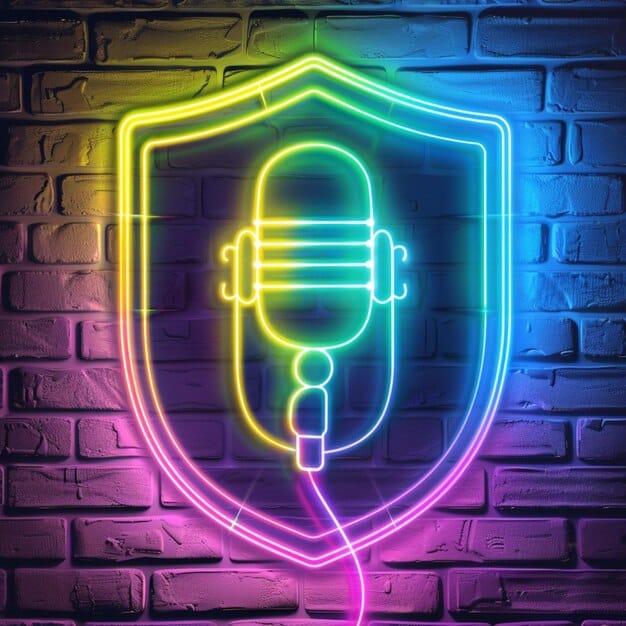Podcast Legal Considerations: Copyright & US Protection in 2025

Podcast Legal Considerations in 2025 are crucial for US-based podcasters, focusing on avoiding copyright infringement, understanding music licensing, trademarking your brand, and implementing proper disclaimers for legal protection.
Launching a podcast in the US? Understanding Podcast Legal Considerations: Avoid Copyright Infringement and Protect Your US Podcast in 2025 is non-negotiable if you want to avoid legal troubles and build a sustainable brand.
Podcast Legal Landscape in the US: An Overview
The podcasting world is booming, but with increased popularity comes increased scrutiny. Understanding the legal landscape is vital for anyone creating audio content in the US. This section provides an overview of the key areas you need to be aware of.
From copyright laws to advertising regulations, failing to comply can lead to hefty fines and even legal action. Knowing your rights and responsibilities is the first step towards building a legally sound podcast.
Key Areas of Legal Concern for Podcasters
There are several legal considerations that podcasters need to be aware of. These include copyright, defamation, advertising regulations, and privacy laws.
- Copyright: Using music, sound effects, or other copyrighted material without permission.
- Defamation: Making false statements that harm someone’s reputation.
- Advertising Regulations: Failing to properly disclose sponsored content or endorsements.
- Privacy Laws: Collecting or using personal information without consent.
Navigating these areas can seem daunting, but it’s essential for protecting yourself and your podcast. The following sections will delve deeper into each of these key areas.

Copyright Law and Podcasting: Avoiding Infringement
Copyright law is a major concern for podcasters. It protects original works of authorship, including music, sound effects, and even spoken content. Using copyrighted material without permission can lead to serious legal consequences.
Understanding the basics of copyright law and how it applies to podcasting is crucial for avoiding infringement. This section will explore the different types of copyrighted material you might encounter and how to legally use them.
Understanding Fair Use
Fair use is a legal doctrine that allows limited use of copyrighted material without permission from the copyright holder. However, fair use is a complex and often misunderstood concept.
There are four factors that courts consider when determining whether a particular use is fair:
- The purpose and character of the use, including whether such use is of a commercial nature or is for nonprofit educational purposes.
- The nature of the copyrighted work.
- The amount and substantiality of the portion used in relation to the copyrighted work as a whole.
- The effect of the use upon the potential market for or value of the copyrighted work.
Even if your use meets some of these factors, it doesn’t automatically qualify as fair use. It’s always best to seek permission from the copyright holder or consult with an attorney.
Obtaining Licenses for Music and Sound Effects
When you want to use music or sound effects in your podcast, the safest option is to obtain a license. There are several ways to do this:
- Directly from the copyright holder: Contact the composer or publisher of the music and negotiate a license agreement.
- Through a licensing agency: Organizations like ASCAP, BMI, and SESAC manage the performance rights of many songs.
- Using royalty-free music: There are many websites that offer royalty-free music and sound effects that you can use in your podcast without paying ongoing royalties.
Make sure you understand the terms of the license agreement before using any copyrighted material. Pay attention to restrictions on how you can use the material and where you can distribute your podcast.
Trademarking Your Podcast Brand: Protecting Your Identity
Your podcast is more than just audio content; it’s a brand. Trademarking your podcast name, logo, and other branding elements can protect your identity and prevent others from using your brand without permission.
A trademark is a symbol, design, or phrase legally registered to represent a company or product. It gives you exclusive rights to use your brand in connection with your podcast and related goods and services.

Why Trademark Your Podcast?
Trademarking your podcast offers several benefits:
- Legal protection: It gives you the legal right to prevent others from using your brand without permission.
- Brand recognition: It helps you build a strong and recognizable brand that listeners can trust.
- Business value: It increases the value of your podcast as an asset.
Without a trademark, you may have difficulty enforcing your rights if someone else starts using a similar brand. Trademarking provides a clear legal basis for protecting your brand identity.
The Trademark Application Process
The trademark application process can be complex, so it’s often best to work with an attorney who specializes in trademark law. The basic steps are:
- Conduct a trademark search to make sure your desired mark is available.
- File an application with the United States Patent and Trademark Office (USPTO).
- Respond to any objections from the USPTO.
- Publish your mark for opposition.
- Receive your trademark registration certificate.
The entire process can take several months or even years, so it’s important to be patient and persistent.
Advertising and Sponsorship Disclosures: Staying Compliant
If you monetize your podcast through advertising or sponsorships, you need to comply with Federal Trade Commission (FTC) regulations. The FTC requires you to clearly and conspicuously disclose any material connections you have with advertisers or sponsors.
This means that you need to let your listeners know when you are being paid to promote a product or service. Failure to do so can result in fines and other penalties.
What is a Material Connection?
A material connection is any relationship between you and an advertiser or sponsor that could affect the credibility of your endorsement. This includes:
- Financial compensation
- Free products or services
- Family relationships
Even if you’re not being paid directly, you still need to disclose any material connections that could influence your endorsement.
How to Disclose Sponsorships
The FTC requires that disclosures be clear, conspicuous, and easily understandable. Here are some tips for making effective disclosures:
- Place the disclosure close to the endorsement.
- Use simple and straightforward language (“This episode is sponsored by…”)
- Make the disclosure audible and easy to hear.
Avoid using vague or ambiguous language like “Thanks to our sponsors.” Be specific about the nature of the relationship.
Defamation and Podcast Content: Avoiding Legal Trouble
Defamation is a false statement that harms someone’s reputation. As a podcaster, you need to be careful about making defamatory statements in your content. If you do, you could be sued for damages.
There are two types of defamation: libel (written statements) and slander (spoken statements). In the context of podcasting, both libel and slander can be relevant.
Elements of a Defamation Claim
To win a defamation lawsuit, the plaintiff must prove the following elements:
- The statement was false.
- The statement was published to a third party.
- The statement was defamatory.
- The plaintiff was damaged as a result of the statement.
Public figures have a higher burden of proof than private individuals. They must also prove that the statement was made with actual malice, meaning that the defendant knew the statement was false or acted with reckless disregard for the truth.
Tips for Avoiding Defamation
Here are some tips for avoiding defamation in your podcast content:
- Verify your facts before making any statements about individuals or organizations.
- Avoid making personal attacks or insults.
- Be careful about expressing opinions that could be interpreted as factual claims.
If you’re unsure whether a statement could be defamatory, it’s best to consult with an attorney.
Privacy Policies and Data Collection: Protecting Your Listeners
If you collect personal information from your listeners, such as email addresses or demographic data, you need to comply with privacy laws. This includes having a clear and comprehensive privacy policy that explains how you collect, use, and protect their data.
Privacy laws vary depending on where your listeners are located. In the US, the California Consumer Privacy Act (CCPA) and other state laws impose strict requirements on businesses that collect personal information.
Elements of a Privacy Policy
Your privacy policy should include the following information:
- What types of personal information you collect.
- How you use the information.
- Who you share the information with.
- How listeners can access and control their data.
Make sure your privacy policy is easily accessible on your website or podcast platform. You should also obtain consent from listeners before collecting their personal information.
Complying with GDPR and Other International Laws
If you have listeners in the European Union (EU), you need to comply with the General Data Protection Regulation (GDPR). The GDPR imposes strict requirements on the collection and use of personal data.
You may also need to comply with other international privacy laws, depending on where your listeners are located. It’s important to consult with an attorney to ensure that you are meeting all applicable legal requirements.
Contracts and Agreements: Formalizing Your Relationships
As a podcaster, you’ll likely enter into various contracts and agreements with guests, sponsors, and other parties. It’s important to have written agreements that clearly define the terms of these relationships.
A well-drafted contract can protect your rights and prevent disputes from arising. It can also provide a clear framework for resolving any issues that do occur.
Types of Contracts You May Need
Here are some types of contracts you may need as a podcaster:
- Guest release agreements: Obtain permission from guests to use their names, voices, and likenesses in your podcast.
- Sponsorship agreements: Define the terms of your relationship with sponsors, including payment, deliverables, and termination rights.
- Independent contractor agreements: Hire freelancers for editing, marketing, or other services.
Make sure you review all contracts carefully before signing them. If you’re unsure about any terms, consult with an attorney.
| Key Point | Brief Description |
|---|---|
| 🛡️ Copyright Law | Avoid using copyrighted material without proper licensing. |
| ⚖️ Trademarking | Protect your podcast brand identity with a registered trademark. |
| 📢 Advertising Disclosures | Comply with FTC regulations by clearly disclosing sponsorships. |
| 🎤 Defamation | Avoid making false statements that could harm someone’s reputation. |
Frequently Asked Questions
▼
Copyright infringement occurs when you use copyrighted material, such as music or sound effects, in your podcast without obtaining the necessary permissions or licenses from the copyright holder.
▼
You can legally use music in your podcast by obtaining licenses from the copyright holder, using royalty-free music, or relying on fair use principles, although the latter can be risky and fact-dependent.
▼
Trademarking your podcast name protects your brand identity, prevents others from using a similar name, and gives you legal recourse if someone infringes on your trademark.
▼
Sponsorship disclosures are clear and conspicuous statements that reveal any material connections you have with advertisers. They’re important for maintaining transparency and complying with FTC regulations.
▼
To protect your podcast from defamation lawsuits, always verify your facts, avoid making personal attacks, and be cautious when expressing opinions that could be interpreted as factual claims. Consulting legal counsel is advisable.
Conclusion
Navigating the legal complexities of podcasting in the US requires careful attention to copyright, trademark, advertising, and privacy laws. By understanding these key Podcast Legal Considerations: Avoid Copyright Infringement and Protect Your US Podcast in 2025, you can minimize your risk, protect your brand, and create content with confidence.





